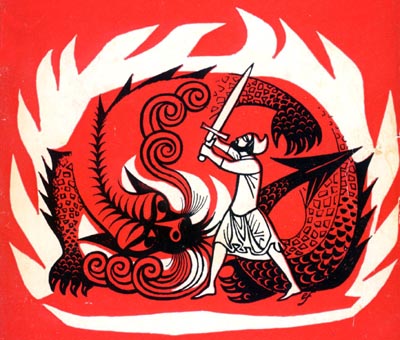Translation
Recordings
Showing Mourning
Seeking Meaning
Closing
Back To Top
Abstract
A reflection on Beowulf's death dwells on the dragon.
Back To Top
Translation
"That which had happened was painfully felt
by the young man, when he on the ground saw
that dearest one pitiably suffering
at his life's end. The slayer also lay so,
the terrible earth dragon was bereaved of life,
by ruin overwhelmed. In the hoard of rings no
longer could the coiled serpent be on guard,
once he by sword edge was carried off,
hard, battle-sharp remnant of hammers,so
that the wide flier by wounds was still and
fallen on earth near the treasure house. Never
after did he move about through the air by flight
in the middle of the night, in his rich possession
glorying, never could he make more appearances,
since he fell to earth at the war leader's deed of the
hand."
(Beowulf ll.2821-2835)
Back To Top
Recordings
Old English:
Modern English:
Back To Top
Showing Mourning
The first question to surface here, like the hideous sea beasts pulled from Grendel's Mother's mire, is why a section of the poem that's showing Wiglaf's grief for Beowulf immediately after his death dwells so long on the dragon rather than Beowulf.
It could be that the poet/scribe went this way because so much of the rest of the poem is given over to Beowulf. Or it could be that Wiglaf's attention is simply drawn to the dragon because of the sheer spectacle of the sight. Though, it could also be that Wiglaf looks over to the dragon for the sake of contrast, to put off the reality of Beowulf's death for just a short time so that he, as all but Beowulf's named successor, can have a brief respite before he must coldly go forth and fulfil his duty as the new Geatish leader.
Of course, it could also be the poet's own voice that pulls away from Wiglaf at this point, leaving his perspective behind for a time to turn a little more omniscient, and to give us, the listers/readers a view of the dragon as it lay dead so that we can contrast it with Beowulf.
Back To Top
Seeking Meaning
Germanic culture widely held that dragons were symbols of the greed that would undermine the gift-centric Germanic society. So perhaps the focus on the dragon and the recounting of how it can no longer do anyone any harm suggests that greed itself has been defeated, and by one so noble as to sacrifice his own good for going against the advice of his counsel and fighting the dragon.
Maybe even the defeat of greed and the destruction of the Geats themselves that is an almost inevitable result (since they're now kingless and sitting on all of this gold) are related.
If this version of the poem is as Christian as some believe, then this shift over to the dragon shouldn't be read as Wiglaf's or the poet/scribe's attempt to contrast a death with a death, but instead as a way to show that the perfection of a society through the defeat of its greatest evil leaves that society at its end.
If Beowulf was ever used as a missionary tale, then this part of the poem could well be that which attempts to sooth potential converts into the belief that in becoming Christian their previous beliefs die off and they enter into something more perfect.
Or, again, their physical being ends, but just as Beowulf persisted up until he defeats his society's major evil, so too would the spirit of the assimilated society persist in its people. Plus, missionaries would probably say the new converts were all imbued with the spark of life that, in the Christian tradition, is generally regarded as a spoken thing - just as this story itself would've been at the time, even after having been written out.
Back To Top
Closing
So could this episode in the Beowulf saga be another key moment in the use of the poem as missionary propaganda, or is it just the poet/scribe's representation of Wiglaf's mourning? Leave a comment in the box to let me know your thoughts!
Next week, stanza three of "Dum Diane vitrea" will drop, and Wiglaf meets the cowardly thanes as they slink onto the scene.
Back To Top

No comments:
Post a Comment